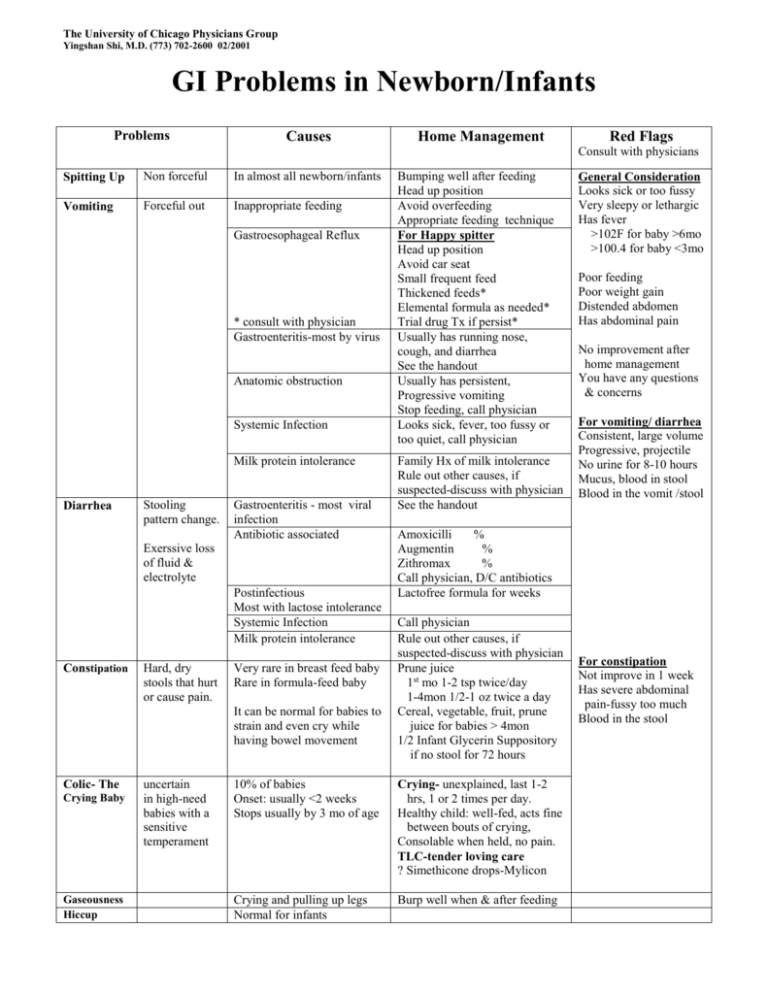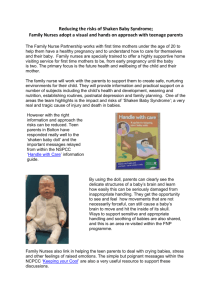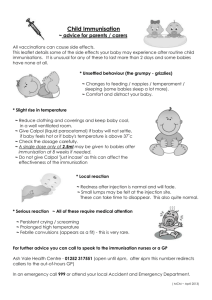GI Problems in Newborn/Infants
advertisement

The University of Chicago Physicians Group Yingshan Shi, M.D. (773) 702-2600 02/2001 GI Problems in Newborn/Infants Problems Causes Home Management Red Flags Consult with physicians Spitting Up Non forceful In almost all newborn/infants Vomiting Forceful out Inappropriate feeding Gastroesophageal Reflux * consult with physician Gastroenteritis-most by virus Anatomic obstruction Systemic Infection Milk protein intolerance Diarrhea Stooling pattern change. Gastroenteritis - most viral infection Antibiotic associated Exerssive loss of fluid & electrolyte Postinfectious Most with lactose intolerance Systemic Infection Milk protein intolerance Constipation Hard, dry stools that hurt or cause pain. Very rare in breast feed baby Rare in formula-feed baby It can be normal for babies to strain and even cry while having bowel movement Colic- The Crying Baby Gaseousness Hiccup uncertain in high-need babies with a sensitive temperament Bumping well after feeding Head up position Avoid overfeeding Appropriate feeding technique For Happy spitter Head up position Avoid car seat Small frequent feed Thickened feeds* Elemental formula as needed* Trial drug Tx if persist* Usually has running nose, cough, and diarrhea See the handout Usually has persistent, Progressive vomiting Stop feeding, call physician Looks sick, fever, too fussy or too quiet, call physician Family Hx of milk intolerance Rule out other causes, if suspected-discuss with physician See the handout General Consideration Looks sick or too fussy Very sleepy or lethargic Has fever >102F for baby >6mo >100.4 for baby <3mo Poor feeding Poor weight gain Distended abdomen Has abdominal pain No improvement after home management You have any questions & concerns For vomiting/ diarrhea Consistent, large volume Progressive, projectile No urine for 8-10 hours Mucus, blood in stool Blood in the vomit /stool Amoxicilli % Augmentin % Zithromax % Call physician, D/C antibiotics Lactofree formula for weeks Call physician Rule out other causes, if suspected-discuss with physician Prune juice 1st mo 1-2 tsp twice/day 1-4mon 1/2-1 oz twice a day Cereal, vegetable, fruit, prune juice for babies > 4mon 1/2 Infant Glycerin Suppository if no stool for 72 hours 10% of babies Onset: usually <2 weeks Stops usually by 3 mo of age Crying- unexplained, last 1-2 hrs, 1 or 2 times per day. Healthy child: well-fed, acts fine between bouts of crying, Consolable when held, no pain. TLC-tender loving care ? Simethicone drops-Mylicon Crying and pulling up legs Normal for infants Burp well when & after feeding For constipation Not improve in 1 week Has severe abdominal pain-fussy too much Blood in the stool The University of Chicago Physicians Group Yingshan Shi, M.D. (773) 702-2600 08/97, 02/2001 INSTRUCTIONS FOR DIARRHEA OR VOMITING INFANT (LESS THAN 1 YEAR OLD) Day 1 . Stop formula, milk and all solid foods for next 12 to 24 hours if vomiting or diarrhea is severe. . Give your baby an oral electrolyte solution- Pedialyte, Infalyte, Ricelyte, Kao-lectrolyte etc. one teaspoon for 1st 30 minutes then one table-spoon (1/2 oz) for next 30 minutes then 1 oz for next 1 hour If tolerated, then up to 1-2 oz every 1-2 hours Breast feeding may continue, but still may need additional oral electrolyte solution between the breast feedings etc. If the baby is older than 6 month age and dose not like Pedialyte, you can also use Kool-Aid, flat soda (shake out the fizz) . Avoid sweet drinks such as cola, or any juices No plain water. Do not give your baby clear liquids for more than 24 hours without talking to your doctor Day 2 . When the baby tolerates 2 oz oral electrolyte solution for 2-3 times, you can consider giving formula. At first, feed 1/2 strength formula (mix formula 1 oz with Pedialyte or Infalyte 1 oz) for 12-24 hr. If tolerated, then advance to full strength formula. Start small amount as 1/2 to 1 oz, then gradually increasing if tolerated. May change the formula to Emfamil Lactofree or Similac Lactofree for 2 weeks because some babies develop lactose intolerance after viral infection . If the baby is greater than 6 month old, you can start soft foods such as rice cereal, banana, or applesauce Day 3 . Resume regular diet. . Return to clinic as scheduled by your physician. CALL YOUR DOCTOR . If the vomiting and diarrhea do not improve Your child is unable to take fluids or is weak, unusual drowsiness or fussiness You think your child looks dry No urination (wet diaper) for 8-10 hours and above Depressed soft spot Sunken eyes, no tears when baby crying . Blood in the vomit or stool, or brown flecks like coffee grounds in the vomit Has fever >102F for baby >6month of age; >100.4F for baby <3month of age Has abdominal pain You have any questions or concerns





